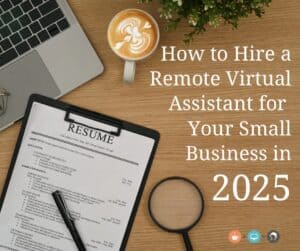Why Small Businesses Choose Concierge Services

Hiring can be one of the most stressful parts of running a business. Between sorting through applications, interviewing candidates, and making the right choice, it’s easy to feel overwhelmed when your time is already stretched thin. For small business owners who need to hire remote workers, the process can feel even more daunting. That’s where concierge services come in. By letting professionals handle the hiring process for you, you can save valuable time, reduce stress, and feel confident that the right person is joining your team.
Taking the Guesswork Out of Hiring
When you post a job on a large hiring platform, you’re often flooded with hundreds of applications, many of which don’t match your needs at all. Sorting through them is time-consuming and frustrating. Our concierge service eliminates that guesswork. We carefully review applicants, pre-screen resumes, and handpick the top matches for your role. You don’t have to spend nights scrolling through applications or worrying you’ve missed the perfect candidate because we make sure the right options are delivered directly to you.
Tailored for Small Business Needs
Big corporations have entire HR departments to handle recruiting. Small businesses don’t. You need someone who understands that your budget and time are limited, and that every new hire has a big impact on your business. Our concierge service is designed specifically with small businesses in mind. Instead of cookie-cutter recommendations, you get personalized support that reflects your industry, your company culture, and your unique hiring needs.
Save Time Without Sacrificing Quality
Every hour you spend buried in resumes is an hour not spent growing your business, serving your customers, or developing new ideas. Concierge services give you back that time while ensuring the quality of your hire remains top-notch. We carefully vet candidates, checking for not only skills but also working to make sure they are a good fit. This way you get the quality of a traditional hiring process in a fraction of the time.
Avoiding the Costly Mistakes of a Bad Hire
One of the biggest concerns small businesses face is making a “bad hire.” Bringing in the wrong person can cost both a lot of time and money. Our concierge service is built on years of experience connecting small businesses with skilled, family-friendly remote talent. We know what qualities make a strong remote employee such as self-motivation, communication skills, accountability, and we use that expertise to filter applicants before they ever reach you. That means fewer hiring mistakes and greater confidence in your choice.
A Stress-Free, Streamlined Experience
The hiring process can feel like a second job. Writing the perfect job description, posting it in the right places, reviewing endless resumes, scheduling interviews is enough to drain your energy before you’ve even found the right candidate. With our concierge service, all of that is handled for you. We craft the posting, promote it to the right audience, manage the first round of reviews, and present you with only the strongest candidates. You stay in control of the final decision, but the heavy lifting is taken off your plate.
Perfect for Remote and Flexible Roles
Small businesses often need part-time, project-based, or flexible roles filled quickly. Traditional hiring sites aren’t designed to prioritize those needs, but our concierge service specializes in them. Whether you’re looking to hire a virtual assistant, a part-time bookkeeper, or a customer support specialist, we know where to find reliable stay-at-home moms and experienced professionals who thrive in remote roles. This makes our service the best place to hire flexible, work-from-home talent without worrying about long delays or mismatches.
Cost-Effective for Growing Businesses
Hiring mistakes can be expensive, and big recruiting firms often charge rates that are out of reach for small businesses. Our concierge service is an affordable job posting solution that balances cost-effectiveness with high-quality results. In fact, we offer three different levels of service to fit every budget! Instead of paying for endless ads or expensive recruiters, you get a streamlined process at a price designed for growing businesses.
Why Businesses Keep Coming Back
The reason small businesses choose our concierge service again and again is simple: it works. They save time, avoid stress, and find employees who fit their needs. When hiring feels seamless instead of overwhelming, it allows business owners to stay focused on what they do best: running and growing their company.
Take the Stress Out of Your Next Hire
You don’t have to manage the hiring process alone. With our concierge service, you get a partner who understands small business challenges and delivers reliable, remote-ready candidates quickly. If you’re ready to stop stressing over job postings and start enjoying a smoother, smarter way to hire, our team is here to make it happen. Check out our concierge services today!









